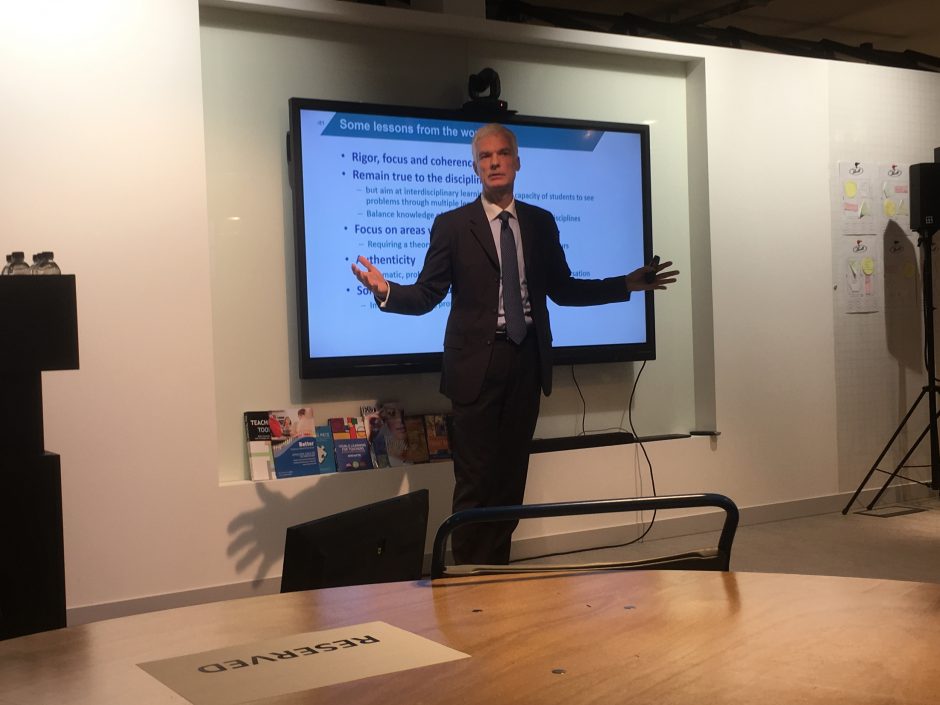Back in September Dylan Wiliam wrote “The nine things every teacher should know.” Last night, Phil Stock The Best Laid Plans 101 reasons why lessons go wrong. In mischievous mood, I thought I’d see what wriggle room there was in Wiliam’s post. I forecast that I will live to regret this decision. Picking a fight with Wiliam on teaching is like picking a fight with the biggest kid in the playground. If I flounders, I can always blame Phil @joeybagstock.
Nobody cares
Nobody cares how much you know until they know how much you care.
Where does that statement begin and end? Is it not almost a logical fallacy? It is almost an anastrophe, at least it has that Yode-esq rhythm. How do teachers show that they care? There is the artistic EI aspect of teaching and then there is the craft. Most often, you hear about teacher enthusiasm, teachers loving their subject, having a “deep passion” for their subject… is that showing your students that you care? So are we back with what teachers know? It feels ouroboros?
Learning is a change in long-term memory
Very little wriggle room here other than what do we learn? Or do we learn what we attend to? Is learning what we attend to? Evidence based teaching, memory and retrieval is what I have been attending to most recently. Hence why I have referenced it here. Now adding this point is like calling out the biggest kid in the playground from the far side of the playground.
Memory is the residue of thought
The only addition here, is that testing before teaching (or test-enhanced learning) has been shown by Bjork and Bjork to improve outcomes. I do not know why, Bjork and Bjork can only speculate at the moment. The addition explanation on DD – ‘desirable difficulties’ made sense to me.
Learning requires forgetting
Well, if that is the case… [add your own punchline here]. As Wiliam points out, this is intuitively a misleading headline. Rather it advocates for distributed practice and retrieval practice, more from Bjork and Bjork. It is an approach I find works particularly well in skills-based technical sports sessions. For example, in teaching novice players new techniques. In a academic session, this post about the work of Karpicke left me astounded. I am not willing to take on point 4.
If you don’t know where you’re going, you might wind up someplace else
I am a big Yogi Berra fan too, having been introduced to his berra-ism whilst studying in the states. Hearing Wiliam’s spends much of his time State side I am hardly surprised he has stumbled upon him too. I can see Wiliam using
We made too many wrong mistakes.
Yogi Berra
to describe the changes in education in his next talk sometime soon. Or
Nobody goes there anymore. It’s too crowded.
Yogi Berra
for when you get to discuss the last dismissed education fad.
I get destination signposting is important. I get learning intentions/learning outcomes/ lesson outcomes (pick your poison) are “something of a dogma.” I acknowledge that the start of the lesson, is not always the best place for a learning outcome to be shared. Nor do I subscribe to the levelled lesson outcomes (increasing the demands on the teachers and class to manage or subscribe to the appropriate outcomes). My point is, the use of learning outcomes should be more just one framing method, possibly milestones and destinations are more useful that single lesson outcomes. Think Mario flags. Here is why:
- It is commonly referenced that a single lesson is the wrong unit for planning (numerous podcasts, keynotes and so forth, no evidenced research paper here, sorry Dylan). There is confirmation bias here, I tend to agree.
- Lessons vary in length.
- Learning outcomes vary in the number of lessons required to achieve them.
- Sharing learning outcomes are often missed opportunities for actual learning or retrieval.
- Mixing it up a little is the art of teaching, (again, no empirical evidence there). Whereas most of William’s post covers the science (understandably). What is in the box? Is a great lesson, to spark intrigue, once in a while. The lesson that is turned upside down on it’s head by a wonderful question or student misdirection. What of the learning outcome then?
The answers of confident students are a bad guide to what the rest of the class is thinking
Point 7 is possibly the curse of novice teachers. Many a time, I would have left the classroom duped by those confident students, arms stretched in eagerness, to answer questions without sufficient challenge.
Rarely are all students equally confident, if they are, it is either a very small group or the question is far to easy. I am there for interested in the use of confidence questions. Questions set, with student are to offer a confidence or certainly rating. Quite often, after a six second wait time pause (I jest), before taking an answer, I will add, “that is positive… [eyebrows raised] How many of your are surgeon sure.” I find “certainty rating” opportunities present themselves in more scientific subjects. I know that “certainty based marking” is applied in medical assessment (that’s where I got the surgeon sure reference from).
Certainty Based Marking (CBM) involves asking students not only the answer to an objective question, but also how certain they are that their answer is correct. The mark scheme rewards accurate reporting of certainty and good discrimination between more and less reliable answers. This encourages reflection about justification and soundness of relevant knowledge and skills, and probes weaknesses more deeply.
With CBM, when students think about justification you gain EITHER reasons for high confidence OR if you see reasons for reservation. It is backed by significant statistical modelling and has highly computational adaptations for setting points awarded, deducted. Head over to UCL if I have perked your interest. Another area of interest in Multiple Choice Questions, where I learnt about ARQs. I leave that there.
The only thing that matters about feedback is what students do with it
Tough to argue with not withstanding that Wiliam’s is at pains to tell us that not all feedback is beneficial.
Effective group work requires individual accountability
Effective group work is really hard? Getting students working as a group, rather than in a group requires real educator expertise and I student efficacy. If I am honest, I have not yet nailed that delivery model. I am not yet convinced that it serves our assessment model well either.
Students have deep insights into their own learning
We are asking teachers to be responsive. Typically terminally, I would ask middle leaders to seek feedback on their curriculum from students (I borrowed the idea from a café visit). The information gathered was useful, comparing survey summaries of different departments was interesting. We did make curriculum decisions based on the feedback (see the only thing that matters about feedback is what [teachers] do with it) however as Wiliam’s offers, some of the students were quite keen to avoid, what the staff felt were desirable [essential] difficulties.
Nothing of Sweller’s Cognitive Load Theory? Listen to the TES podcast here. Surely a top ten would have been better click bait?



